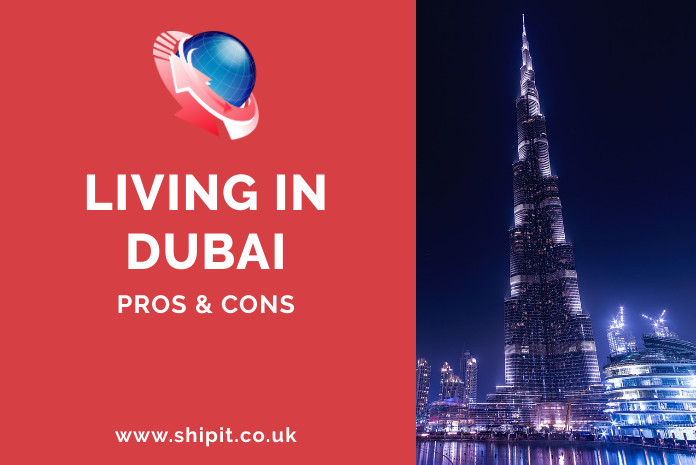
Last Updated: 4th September 2025 by Martha Lott
The thought of living overseas is always alluring, but deciding on the ideal location for your new home can be a challenge. Dubai, a dazzling beacon in the United Arab Emirates, has recently emerged as a highly sought-after destination.
This thriving metropolis has become a magnet for people from around the globe, including a growing number of British ex-pats drawn to its sunny climes and wealth of opportunities. It’s estimated that over 240,000 Brits have already made the leap to this dynamic city, but is it the right fit for you?
Dubai offers a compelling mix of career prospects, enhanced living standards, and an entirely new cultural experience. Its unique blend of traditional Eastern values and modern Western amenities creates an intriguing environment. Nonetheless, it’s essential to carefully consider both the positives and negatives before making such a significant decision.
In this article, we aim to give you a balanced view of what life in Dubai truly entails for a British ex-pat. From the clear blue skies and high-paying job opportunities to the permit procedures and extreme summer heat, we’ll explore the realities of living in Dubai, using both factual information and personal experiences.
If you’re planning a move to Dubai from the UK, learn about our international removals services to Dubai with faster shipping and safer packing, or get a free quote on our website for an estimate to ship your belongings to the UAE.
Keen to get to the pros and cons of life in Dubai? Here’s a quick table to summarise the pros and cons that we’ll discuss in this article.
A Brief Overview of Dubai
As the second-largest emirate in the United Arab Emirates, Dubai stands tall as a city of superlatives. It’s home to the tallest building in the world, the largest shopping mall, and even the largest artificial islands. But beyond these iconic landmarks, Dubai is a multicultural city with residents hailing from all corners of the globe, creating a cosmopolitan atmosphere that is as diverse as it is dynamic.
In the last few decades, Dubai has transformed from a quiet fishing village into a bustling metropolis, with an estimated population of over 3.7 million people in 2024 (up by over 25,000 in just the first three months of 2024). Despite this rapid growth, only 15% of the city’s inhabitants are Emirati nationals – the rest are a mix of expats and migrant workers, adding to Dubai’s multicultural flair.
The lifestyle in Dubai is one that seamlessly blends tradition with modernity. With an array of high-end restaurants, vast shopping centres, and outdoor adventures at your fingertips, there’s never a dull moment in this city. And let’s not forget the wealth of career opportunities across diverse sectors, making it a professional hub for many.
A Glimpse at Everyday Life
Day to day life in Dubai varies greatly depending on one’s preferences, but a common thread amongst all residents is the high standard of living. The city is renowned for its safety, cleanliness, and infrastructure. Many residents enjoy spending their weekends at one of Dubai’s beautiful beaches, or exploring the desert landscapes that lie just beyond the city’s outskirts.
For those who prefer an urban lifestyle, the city offers countless high-end shopping experiences, dining options from all around the world, and a vibrant nightlife scene. And, thanks to the wide usage of English in Dubai, British expats can navigate the city and its offerings with ease.
Dubai is also a city of festivals and events. Be it film festivals, jazz concerts, food festivals, or the famous Dubai Shopping Festival, there’s always something happening in this lively city. It’s a place that truly offers something for everyone, with a lifestyle that can be as laid-back or as thrilling as you want it to be.
Remember, though, every city has its pros and cons. Let’s take a deeper dive into the key benefits and potential challenges that come with living in Dubai.
The Pros of Living in Dubai
The city of Dubai offers a host of benefits that make it an attractive destination for many individuals and families alike. These advantages range from an ideal climate to a thriving job market, a tax-free income, and much more. Let’s take a closer look at these perks that make the city stand out as a desirable place to live.
Great Weather
When considering Dubai, one of the first things that often springs to mind is its year-round sunshine. With over 300 days of unbroken sunshine each year, this desert city is a sun-seeker’s paradise.
For approximately eight months of the year, from October to May, Dubai enjoys a comfortable climate, with temperatures typically ranging between 20°C to 30°C (68°F to 86°F). During this period, the city boasts cloudless blue skies and pleasant sea temperatures, perfect for taking advantage of the city’s beautiful beaches and outdoor activities.
Life in Dubai means you’ll have the weather and amenities to spend most of your time outdoors, whether you’re basking by the sea, enjoying a round of golf, or simply sipping coffee at a sun-drenched café. The enviable climate truly sets Dubai apart and offers a substantial upgrade from the often unpredictable and rainy weather in the UK.
However, it’s worth noting that Dubai’s weather isn’t perfect all year round. The summer months can bring intense heat, but more on that later in our ‘cons’ section. For now, if you’re a sun-lover, Dubai’s predominantly sunny and dry climate might just be a significant point in its favor.
Job Opportunities
Dubai’s booming economy has led to a flourishing job market with an abundance of opportunities across diverse sectors. The city serves as a business hub for the Middle East and beyond, hosting regional offices for many international corporations. The strong presence of global companies in sectors such as finance, technology, construction, hospitality, and retail, provides a plethora of job openings for ex-pats.
Whether you’re a seasoned professional looking to advance your career or a recent graduate seeking an exciting start, Dubai’s vibrant job market offers potential for growth and professional development. The city’s strategic location and importance in global business make it an exciting place to work and build valuable international experience.
No Income Tax
A major draw for many professionals going to Dubai is the absence of income tax. The earnings you make from your employment are not subject to any form of tax, which can significantly boost your take-home salary compared to other countries with high income tax rates, like the UK.
This policy extends to corporate taxes as well, with companies in many sectors enjoying a tax-free environment. This not only attracts businesses to set up in Dubai but also indirectly benefits employees as companies are often able to offer competitive salaries and benefits.
Good Education
For families considering Dubai, the education system is an important consideration. Fortunately, Dubai boasts a high standard of education, particularly in its international schools. Many of these schools adhere to the British education system, with the National Curriculum of England taught in primary schools and IGCSE and A-Level qualifications offered at the senior level.
This continuity in educational standards can ease the transition for children moving from the UK and provides peace of mind for parents. Do note that education isn’t free for non-citizens in Dubai, and the costs for private schooling can be substantial. However, the quality of education and facilities offered often make it a worthwhile investment for many families.
Vibrant Social Life
Dubai offers a vibrant social scene, with an array of activities and venues to suit all tastes. Whether you are a foodie, a sports enthusiast, or a social butterfly, Dubai has something for you.
Expats often enjoy joining private beach clubs, sports groups, and social clubs to make new friends and enjoy their downtime. The city is home to a variety of restaurants offering cuisines from all over the world, high-end shopping centers, art galleries, music festivals, and more. Not to mention the host of events and concerts by international artists that the city attracts.
Moreover, the city is renowned for its nightlife, with a plethora of clubs, bars, and entertainment venues to choose from. So, whether you prefer a quiet evening out with friends or dancing the night away, Dubai’s vibrant social scene won’t disappoint.
Accessibility
Located at the crossroads of Europe, Asia, and Africa, Dubai’s strategic geographic location makes it an excellent base for travel. Dubai International Airport is one of the busiest in the world, offering flights to and from most major destinations across the globe.
Whether you wish to explore the ancient cultures of Asia, the vibrant cities of Europe, or the exotic landscapes of Africa, living in Dubai makes it all a short flight away. Plus, the city itself is a major tourist destination, with attractions like the Burj Khalifa, Palm Jumeirah, and the Dubai Mall, adding to the appeal of living in Dubai.
English is Widely Spoken
While Arabic is the official language of the UAE, English is widely spoken and understood in Dubai. This makes the transition easier for English-speaking expats as they can easily communicate and navigate through daily life. Signs, menus, and official documents are typically available in English, making it easier for expats to find their way around.
High Standard of Living
Dubai is synonymous with luxury and a high standard of living. The city is safe, clean, and boasts world-class infrastructure, making it a comfortable place to live. Dubai’s crime rate is notably low, largely due to strict laws and effective enforcement. This makes it a secure environment for individuals and families alike.
From sprawling villas to high-rise apartments with breathtaking views, the housing options in Dubai are extensive and often luxurious. Add to this a plethora of shopping outlets – from high-end designer stores to traditional markets (souks) – and you’ve got a city that caters to every lifestyle and budget.
Additionally, the city is home to some of the world’s finest restaurants, luxury hotels, and exclusive clubs. The presence of many millionaires and billionaires in Dubai testifies to the city’s high standard of living and appeal to those seeking a luxury lifestyle.
Low Transport Costs
The cost of operating a car in Dubai is inexpensive thanks to the incredibly cheap price of petrol. Taxi fares are also cheap, and the government is also making a major investment in improving public transportation.
Accepting of Other Religions
Despite being an Islamic city, Dubai is highly tolerant of other religions, offering a comfortable environment for people of all faiths. It is home to numerous places of worship catering to different religions, including churches, temples, and gurudwaras, alongside mosques.
Dubai’s tolerance extends to lifestyle aspects as well. While it’s true that the city abides by Islamic laws and customs, it also respects the practices of its diverse expat population. For instance, non-Muslims are allowed to consume alcohol in licensed venues and during Ramadan, non-Muslims are permitted to eat and drink during daylight hours in private and in designated areas.
Having highlighted the attractive benefits of living in Dubai, it’s crucial to consider the other side of the coin as well. In the following sections, we will discuss the challenges you might face while living in Dubai and important factors to weigh before making a decision.
The Cons of Living in Dubai
Just like any major decision, choosing to relocate to Dubai comes with a set of potential challenges that you must consider. In this section, we’ll discuss some common issues faced by expats, helping you gain a realistic picture of what life in Dubai could entail.
You’ll Need a Permit for That
Living in Dubai involves dealing with a range of permit procedures. You will need permits or licenses for a variety of everyday aspects, including getting a job, driving a car, and even purchasing alcohol. While these processes may initially seem overwhelming, understanding what they entail can make them more manageable.
A residence visa, for example, is necessary for anyone planning to live in Dubai, and it typically requires sponsorship from an employer or a family member who resides in Dubai. Obtaining this visa involves submitting certain documents and undergoing a health check.
Next comes the Emirates ID, a legal requirement for all residents of the UAE. This card contains vital biometric and personal data and is used in all dealings with government departments.
If you plan to drive in Dubai, it’s no surprise that you will need a local driving license. Some nationalities, including the UK, can simply exchange their existing license, while others might have to take driving lessons and pass a test.
Understanding and navigating these permit procedures is crucial to your move, so it’s best to thoroughly research and prepare for this bureaucratic aspect of living in Dubai.
Premarital Cohabitation
Dubai’s legal system is rooted in Islamic law, which has implications for personal relationships. One of these is that cohabitation by unmarried couples is technically illegal. While in practice this law is often overlooked, particularly in expat communities, it’s important to be aware of it.
If you’re moving with a partner to whom you’re not married, it’s worth understanding this aspect of Dubai’s law. While many unmarried couples do live together in Dubai without issue, there can be legal complications, particularly if a dispute arises or if the relationship is made public.
Rent Can be Expensive
If you are relocating from a regional area in the UK rather than from Central London, you may find that rents are expensive. The average rental for a one-bedroom apartment in Dubai is about £1,614.65 (compared with around £1,800 in London), while rents average about £2,791.93 for a three-bedroom apartment. These figures drop as you look outside of the city centre, with the average one-bedrookm costing about £915.82 a month, and an average three-bedroom apartment costing £1,716.71 a month.
Living in Dubai can be expensive, even though there are fewer deductible taxes, property costs can become an expensive necessity.
On top of housing, costs for education, healthcare, and everyday goods and services can add up. Therefore, while you might be earning a tax-free salary, it’s worth factoring in these costs when considering your potential lifestyle in Dubai.
Intense Heat
While the climate in Dubai is pleasant for most of the year, the summer months (June to September) can be intensely hot. Daytime temperatures can exceed 40℃, which can be quite uncomfortable and necessitates a lifestyle adjustment.
During this period, most activities shift indoors or are scheduled for early morning or late evening. Many expats also plan their annual leave during this time to escape the heat. While air conditioning is widely available and makes the heat bearable, it’s an aspect to consider if you’re not a fan of hot weather.
Censorship and Internet Restrictions
In Dubai, the government exercises some degree of control over media content, and there are internet restrictions that may affect your browsing experience. Certain websites and applications, such as VoIP services like Skype and WhatsApp, are blocked. This may influence how you communicate with family and friends back home.
Cultural Differences and Local Laws
The culture in Dubai is quite different from that in the UK due to its roots in Islamic traditions. Local laws reflect these traditions and may pose a challenge for those accustomed to Western norms. For instance, public displays of affection are frowned upon and can attract fines. Moreover, there are strict laws on dress codes in public places that require both men and women to dress modestly.
Restricted Alcohol Consumption
While alcohol is available in licensed venues in Dubai, the public consumption and transport of alcohol are strictly controlled, and a license is required for purchasing alcohol from stores. These restrictions might be surprising for UK citizens, who are used to more relaxed rules surrounding alcohol.
Lack of Political Freedom
Lastly, the United Arab Emirates is a monarchy with limited political freedoms. While this might not directly impact your daily life, it’s a significant difference from the democratic system in the UK that’s worth considering.
Adding these factors helps us present a more balanced view of what living in Dubai entails. It’s important to remember that everyone’s experience will be unique, and what poses a challenge to one person might not be a problem for another. Ultimately, being prepared and understanding the lifestyle changes can help smooth the transition.
Should I Move to Dubai?
After weighing the numerous advantages and the potential challenges, it’s clear that relocating to Dubai from the UK is a decision that warrants careful thought. While the tantalising weather, exciting job opportunities, tax benefits, and vibrant social life can be incredibly appealing, it’s equally important to consider the permit procedures, cultural nuances, cost of living, and intense summer heat.
Relocating to a different country is more than just a change in scenery; it’s a lifestyle shift that can have far-reaching impacts on your daily life. Being informed and prepared is crucial. The more you know about your potential new home, the smoother your transition will be. Dubai, with its amalgamation of cultures and opportunities, can indeed be a wonderful place to live, but like any other city, it has its own unique set of challenges.
In the end, only you can decide if the pros outweigh the cons. It’s a deeply personal decision that hinges on your individual needs, expectations, and adaptability. But, with the information provided, we hope you’re one step closer to making an informed decision.
Remember, the best way to predict your future is to create it. So, whether you’re just entertaining the idea or are already planning your move, continue to gather information, ask questions, and seek advice from those who have made the move.
Move to Dubai with 1st Move International
At 1st Move International, we offer full door-to-door removals services from the UK to Dubai via shared or full container. Our unique shrink-wrap packing & palletisation allows us to ship alongside commercial goods, which means fast weekly shipping and better protection for our customers’ belongings!
To start planning your Dubai move, contact us or learn about our international removals to Dubai. Looking for an estimate? Simply ask for a quote and we’ll get back to you within 24 hours with everything you need to know.
Additional resources:
About 1st Move International
1st Move International are a specialist international moving and shipping company offering packing, shipping and shipment protection cover for shipping household goods and personal effects overseas. We have a global reach covering over 80 countries and 6500 worldwide destinations. You can get an international removals quote here or find more information on our international removals UK to Dubai service here.




